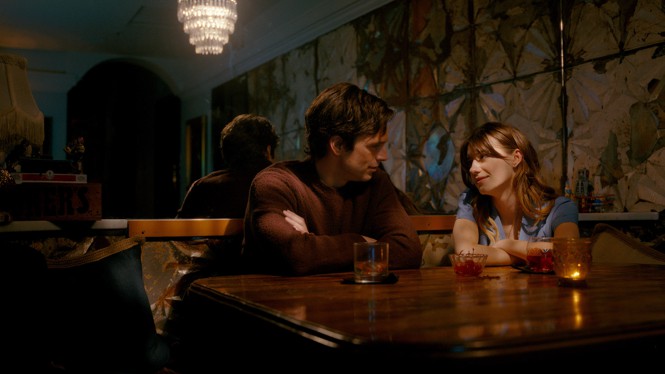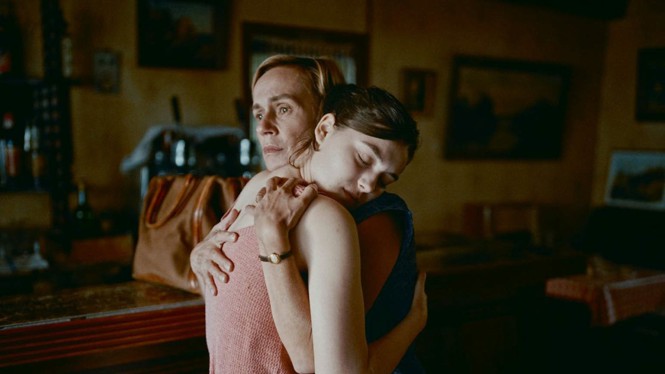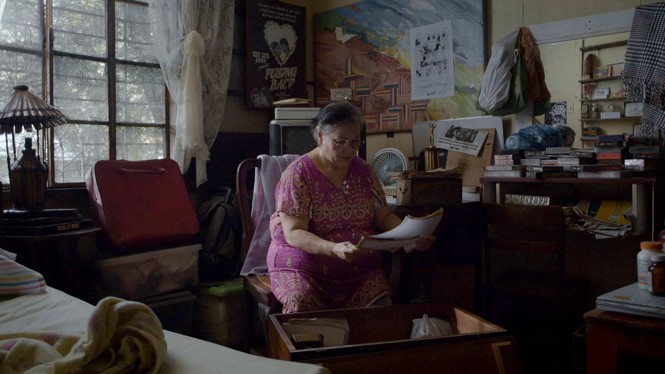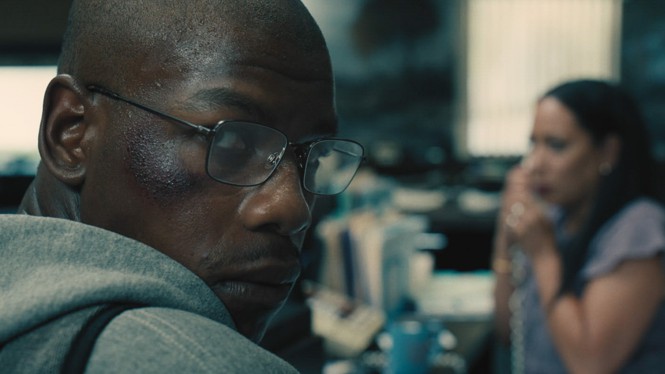For the second year in a row, the Sundance Film Festival had to go completely virtual, but that didn’t stop the annual celebration from giving a robust preview of the most exciting emerging artists in Hollywood. Much of this year’s slate defied the pandemic’s limitations: Twisty horror films didn’t need Park City’s frigid climate to deliver chills. Character studies that grappled with isolation came off as reassuring for the way they proved that productions could work amid COVID-era precautions. And a number of movies treated intimate subjects—including sex positivity and abortion—with such a warm, gentle touch, it felt right to be watching them away from a crowded theater. As always, some titles have already received release dates in the coming months while others are still in the process of scoring distribution deals. However long the industry takes to get these films into your streaming queues or on theater marquees, the ones below are worth the wait.

Fresh (Hulu, March 4)
Dating in the middle of a pandemic looks easy when compared with what happens in this film. Sebastian Stan gives an extravagant performance as the man of Noa’s (Daisy Edgar-Jones of Normal People) dreams until he reveals his rather, well, unusual appetite. Mimi Cave, best known for directing music videos for artists such as Tune-Yards and Vance Joy, brings a witty, stylish flair to this horror film produced in part by Adam McKay, indulging in delectably macabre images while serving up a side of cheeky insight into the modern dating landscape. The final act comes with perhaps too many surprises on the menu, but the film is so much fun that I didn’t mind the extra courses. — Shirley Li
Master (Amazon, March 18)
How do you defeat a threat that exists everywhere around you, and affects, it seems, only you? Master, from the first-time writer-director Mariama Diallo, focuses on the parallel journeys of a Black freshman and the first Black dean of students—called a “master”—at an elite New England university that bills itself as forward-thinking but is haunted by tradition and legends that manifest as supernatural terrors. The film will draw comparisons to Get Out for its exploration of race and privilege in an apparently progressive arena, but it’s an impressively ambitious work in its own right, anchored by a sterling turn from Regina Hall as the titular master, and a script that serves up a series of unflinching twists, each bolder than the last. — S. L.
You Won’t Be Alone (Focus Features, in theaters; April 1)
Don’t be fooled by the premise: Set in Macedonia in the 19th century, this film from the director Goran Stolevski isn’t so much a horror story about a witch terrorizing a series of villages as it is an autopsy of a lonely being trying to understand humanity. Based on regional folklore, the tale follows a shapeshifting entity who embodies a series of different characters (played by an ensemble cast including Noomi Rapace) and narrates her observations and thoughts in halting, affecting asides. Stolevski treats every frame with a gentle, Terrence Malick–ian touch, creating a contemplative—and spellbinding—study of the human condition through the eyes of an unconventional subject. — S. L.

Fire of Love (National Geographic, release date TBD)
Sundance is always a launchpad for a wide range of documentaries, and the standout this year is Sara Dosa’s portrait of the French volcanologists Maurice and Katia Krafft, a couple who spent their lives getting as close to boiling lava and pyroclastic flows as they could. The film, which has been acquired by National Geographic, is filled with staggering research footage the couple took themselves that deserves to be shown on the biggest screens possible. Its lingering power, however, is not just the spectacle but also the thrilling intimacy of its subjects, whose eccentric, danger-seeking romance feels drawn straight out of Hollywood myth. — David Sims
After Yang (A24, spring release)
After Yang is an exciting new film from the writer-director Kogonada, whose debut, Columbus, was a tenderly told drama about human connection, presented in still, painterly frames. After Yang has a similar gentleness, coupled with more ambitious world building. It’s a sci-fi tale about a family whose adopted robotic “son,” Yang (Justin H. Min), experiences a system crash, throwing their entire unit into emotional disarray. Colin Farrell does sensitive work as the patriarch, Jake, who investigates how to save Yang and starts to examine the singular history of an individual who was both beloved and held at an automatic distance because of his artificiality. The story has expansive metaphors to plumb, but they’re balanced by penetrating storytelling about togetherness and otherness in a melancholy future. — D. L.
[Read: The radiant inner life of a robot]
Dual (RLJE Films, release date TBD)
The director Riley Stearns follows up his arch comedy The Art of Self-Defense with this darkly amusing science fiction, set in a world where human cloning has become a mundane fact of life. Diagnosed with a terminal disease, Sarah (Karen Gillan) decides to clone herself to leave someone behind for her boyfriend and mother; when she turns out not to be dying after all, the government mandates that she duel her double to the death for the entertainment of the masses. The film retains Stearns’s fondness for clipped, unnatural dialogue (think Yorgos Lanthimos) and fascination with the rituals of violence. Gillan’s dry double performance in the lead is most memorable, along with a hilariously mordant Aaron Paul as her combat trainer. — D. S.

Happening (IFC, in theaters; release date TBD)
Based on a book by Annie Ernaux, this French film, about a promising literature student seeking an illegal abortion in 1960s regional France, won the prestigious Golden Lion at last year’s Venice Film Festival. Given the potential for the U.S. Supreme Court to overturn Roe v. Wade, abortion dramas have become more urgent lately; Sundance alone offered multiple titles on the subject. Happening, however, doesn’t just feel timely; it also feels personal. With clear-eyed poise, the director Audrey Diwan captures the wrenching loneliness that can come with terminating an unwanted pregnancy—and how judgment of such a choice can be even more crushing than the possibility of breaking an unjust law. — S. L.
Living (Sony Pictures Classics, in theaters; release date TBD)
For this British remake, the author Kazuo Ishiguro adapted the screenplay of Akira Kurosawa’s 1952 classic Ikiru, setting the story of an aging bureaucrat who learns he has only months left to live in postwar London. Though the film may not reach the highs of the original, it presents its own distinct pleasures, including a gracefully subtle performance from Bill Nighy and a winning supporting turn from Aimee Lou Wood (Sex Education), along with frames filled with exquisite period detail. Sentimental but never cloying, Living is an elegant elegy, a reminder to take little in life for granted—and to forgive the times when that lesson gets overlooked. — S. L.
Cha Cha Real Smooth (Apple, release date TBD)
The wunderkind filmmaker Cooper Raiff made his mark in 2020 with the surprisingly insightful college comedy Shithouse. His latest film, which he also wrote, directed, and stars in, is a similarly good-hearted, low-stakes romantic comedy about life after graduation. (It was picked up by Apple in a reported deal of about $15 million—the biggest buy of the festival to date.) Cha Cha Real Smooth centers on a handsome goof, Andrew (Raiff), who strikes up a flirty friendship with a mom (Dakota Johnson) whom he meets at a bat mitzvah. Raiff has once again cast himself as a kindly but fumbling romantic lead, still trying to figure out what he wants from life and how to get it. But Johnson is the real star here, doing disarmingly funny work as she tries to gauge just how sincere Andrew’s feelings are. — D. S.

Leonor Will Never Die (no distribution set)
I almost didn’t watch Leonor Will Never Die. The Philippines-set story, about an elderly action-film maker yearning for her glory days, sounded like a downer. But the film, written and directed by Martika Ramirez Escobar, is a delightful surprise; it’s inventive and original, with flourishes of magical realism—including scenes that place Leonor (a wonderful Sheila Francisco) in the center of her own cheesy ’80s action flicks. Escobar always keeps one eye on the story’s heart, that of Leonor’s deep bond with her children. The ending, which I won’t spoil, had me in tears of laughter and sadness alike. — S. L.
Good Luck to You, Leo Grande (Searchlight Pictures/Hulu, release date TBD)
Sophie Hyde’s comedy could work just as well as a play, considering that almost all of the film is two characters in a room together, discussing the particulars of lovemaking. Emma Thompson plays Nancy Stokes, a retired widow seeking the first satisfying sexual experience of her life; the winsome Daryl McCormack is Leo Grande, a sex worker she’s hired to help her along that path. Thompson is extraordinary as she navigates the various insecurities that come with inexperience, age, and general repression, and McCormack is a charming and understanding match for her. The film’s triumph comes in its final act, when all of the explicit detail the film has been dancing around suddenly rushes to the foreground. The sex is upfront and beautifully presented, and the connection between the two actors makes it entirely unscandalous. — D. S.
Am I OK? (no distribution set)
Tig Notaro and Stephanie Allynne’s feature directorial debut is a hug in the shape of a movie. The story follows a pair of best friends as they take major life steps: Jane (played by Sonoya Mizuno) is about to move to London, and Lucy (Dakota Johnson) at 32 is questioning her sexuality for the first time. The film is part romantic comedy, part coming-out story, part much-delayed coming-of-age tale—and all breezily charming. It won me over for its layered study of a close female friendship and the power such relationships can hold, even when they fracture. The titular question is posed with a delicate curiosity and then answered with just as much care. — S. L.

892 (no distribution set)
Abi Damaris Corbin’s lean and robust thriller sheds light on a real-life incident in which an impoverished Marine veteran named Brian Brown-Easley (played by John Boyega) entered a bank in the Atlanta suburbs and announced that he had a bomb. Corbin co-wrote the story with the acclaimed British playwright Kwame Kwei-Armah, and their approach is blunt but sympathetic. The first half of the film is devoted to Brown-Easley’s efforts to draw attention to his struggles with VA bureaucracy, and the second half widens its perspective to the media and police circus closing in around him. Boyega’s tightly wound but heartfelt interpretation is what helps 892 stand out, along with one of the last screen performances of Michael K. Williams’s career. — D. S.
[Read: You can never forget Michael K. Williams]
Sharp Stick (no distribution set)
Lena Dunham has not directed a feature film since the startlingly raw Tiny Furniture in 2010; after that, she created HBO’s Girls and Camping, hosted Saturday Night Live, and has generally served as an unending magnet for online discourse. She wrote, directed, and acts in Sharp Stick, which is unlikely to break that trend, mixing a goofy, airy sex comedy with the kind of raw character study that is Dunham’s specialty. Sharp Stick focuses on a 26-year-old caregiver to children with special needs, Sarah Jo (Kristine Froseth), a virgin who seems mentally stuck in teenagehood; her affair with the father (Jon Bernthal) of a boy she’s minding then explodes into a journey of sexual maturation as Sarah Jo tries to sprint into some notion of adulthood. Although she is a fairly inscrutable figure, and Dunham’s script never quite arrives at a larger point, these sexual misadventures are full of frankness and humor. — D. S.
Resurrection (no distribution set)
Maybe the best piece of horror filmmaking to come out of this year’s festival is Andrew Semans’s Resurrection, a fable that demands some patience from the audience as it ratchets up the tension before delivering a gonzo final act. Rebecca Hall plays Margaret, a high-achieving single mother with a sarcastic teen daughter; the opening act is mostly concerned with Margaret’s increasing panic over her daughter’s independence, but everything changes when she sees a mysterious man (Tim Roth) from her past, who stirs up old traumas. The mysteries of their connection have to be seen to be believed, but Hall and Roth’s transfixing work (which includes a bravura eight-minute monologue from Hall, straight to camera, laying out the entire backstory) helps ground the rising madness of Resurrection. — D. S.



